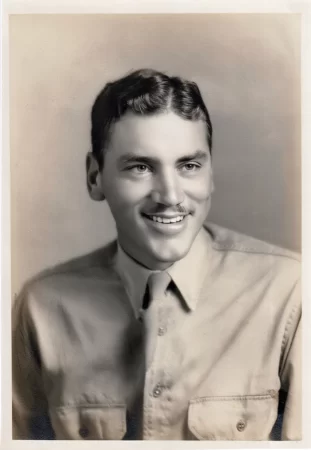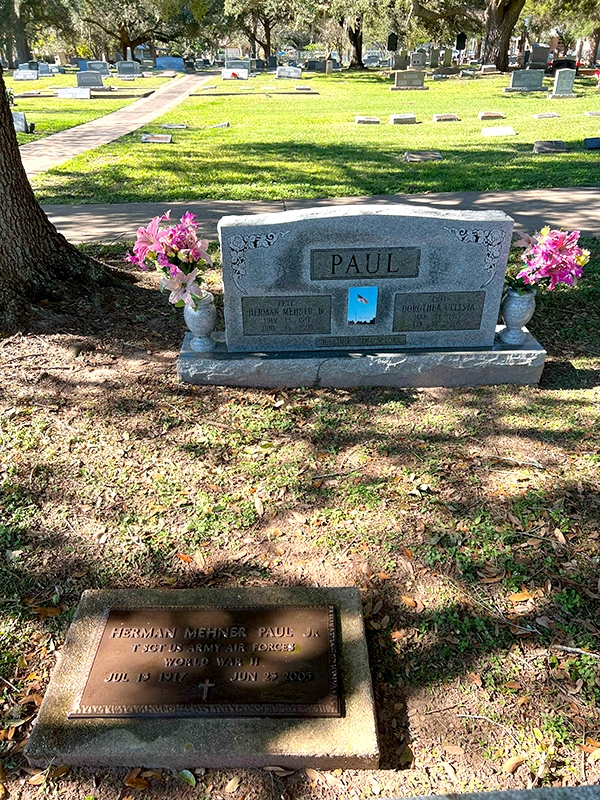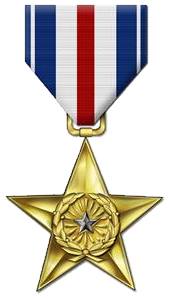(1917-2005)
Hometown boy honored as heroic WWII veteran
 Flags wave on veterans’ headstones in the cemetery in honor of their service to our country. Veteran Herman Mehner “H.M.” Paul Jr. was awarded the Silver Star for services performed during World War II. The Silver Star Medal (SSM) is the United States Armed Forces’ third-highest military decoration for valor in combat. It is awarded primarily to members of the United States Armed Forces for gallantry in action against an enemy of the United States.
Flags wave on veterans’ headstones in the cemetery in honor of their service to our country. Veteran Herman Mehner “H.M.” Paul Jr. was awarded the Silver Star for services performed during World War II. The Silver Star Medal (SSM) is the United States Armed Forces’ third-highest military decoration for valor in combat. It is awarded primarily to members of the United States Armed Forces for gallantry in action against an enemy of the United States.
Paul was born in 1917 in Nickel, Texas, and his family moved to West Columbia in 1929. He graduated from West Columbia High School in 1935 and from there he attended and graduated from Texas Lutheran College in 1938. He was on the football team, played trumpet in the band and was voted homecoming king and most popular. Paul was a regular guy, well liked and smart, and about to serve his country in the United States Army.
While flying missions near Japan, on June 26, 1945, Paul and his crew were participating in a sortie against the airfield installations and defenses of Tsuiki, Kyushu, Japan. Paul was the engineer of a heavy bombardment aircraft, a Liberator bomber, named “Senator.”
The Liberator was one of 20 aircraft that dropped their bombs on the target and then were attacked by 30 Japanese fighters. A thousand enemy bullets shot out the brakes and instruments and severed control wires of the Senator. The plane plunged 4,000 feet while Lieut. William Fleming, of New Jersey, was extinguishing a fire while Paul worked frantically splicing a broken elevation cable.
As he operated the top turret gun, Paul was caught by debris and exploding machine gun cartridges caused by the explosion of a shell just below his gunner’s seat. He quickly sprang to action to patch up a fuel cell spurting gasoline from a shell hole. He sealed the burst petrol tank by snatching up a piece of shattered wood, jamming it in a hole in the tank and sealing it with chewing gum. The hydraulic system was shattered and inoperative, the radio and interphone out, engine panel instruments were useless and above all the elevator control cable hung together by only a few strands of wire. The aircraft was spinning while he joined two broken ends with radio wire. This Paul managed to splice efficiently restoring control of the aircraft.
Although suffering from shock, he repaired the other dangerous damage so well that the pilot was able to bring the bomber and its crew to a safe landing.
Paul said, “The gas tank got it and stuff flew all over. It was the damndest feeling I ever had. I grabbed a piece of wood, plugged the hole and sealed the tank with chewing gum.”
The “Senator” straightened out, dropped to 1,000 feet and settled there. While all this was happening the tail-gunner and waist-gunner drove off three Zeros, shooting one down. Sgt. Bernard Levick, of Pennsylvania, was knocked from his gun station by explosions, but was not injured except for the scratches and cuts. Then the flopping and rolling Liberator struggled for an hour and a half through turbulent weather.
Even though the bomber was riddled with more than 1,000 bullet holes, it returned over hundreds of miles of hostile ocean. Little more than a skeleton, the pilot had to figure out a way of landing. Finally, he instructed the crew to shatter the waist windows and tailgun glass, and hook their parachutes to the gun mounts. These would act as brakes. As the wheels touched down, the crew pulled their parachutes’ rip cords and the opening chutes slowed the brakeless plane. The crew stepped out calmly and counted the bullet holes. Miraculously, none of the crew was wounded.
Paul was honorably discharged, returned home to West Columbia and married Dorothea Phillips. The couple had one son, Guy Paul. Herman Paul died June 23, 2005, and is buried in Old Columbia Cemetery.
Holt, Susan Avera (January 5, 2025)

